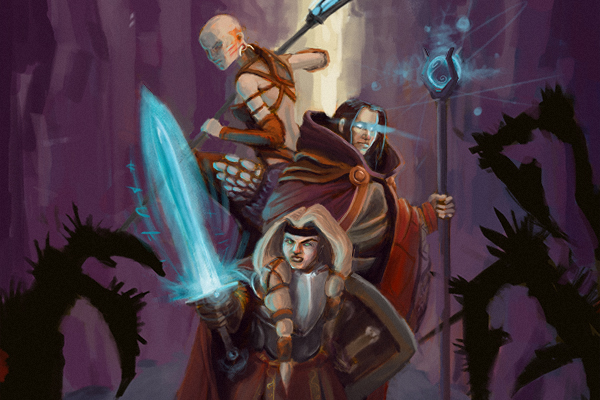Dungeons and Dragons vs. Algebra? I’ll take D&D
All of that time that you spent playing video games and D&D? It’s worth something. In all seriousness, play is an important part of developing creative thinking and problem solving skills, according to Sir Ken Robinson. Certainly, important life lessons may come from trusted mentors or a period of stark and unrelenting adversity. However, I like to think that part of what makes 3D Cloud such a remarkable place to work is that many of my co-workers invested in play from an early age. I credit my high school Dungeons & Dragons playgroup with my own passion for creating fantastic things and solving problems. I know what you may be thinking. “Dungeons and Dragons. Isn’t that something that socially inept losers play in their mother’s basements?” You’re half-right. In high school, I was definitely playing in Mom’s basement. We were dedicated players. Nobody was late, everyone came prepped for battle. My elf fighter was steely eyed, and so was I. We were ready for anything and especially for the unexpected twists and turns that a game might take. We thrived on ambiguity and creative flexibility was our greatest weapon. Dungeons & Dragons is, at its core, an improvisational game about “yes, and…” In a departure from traditional wargaming, each player is assigned a specific character to play. These characters embark upon imaginary adventures in fantasy settings. A game master (GM) serves as the game’s referee and primary storyteller. For the game to work, all of the players have to agree to embrace the creative input of everyone in the group, and build on each contributed detail with their own ideas. Together, players in a D&D game solve dilemmas, engage in battles and gather both treasures and knowledge. In retrospect, Dungeons and Dragons set a solid foundation for how I work today. Here are four things that I learned playing D&D which have helped me to thrive at 3D Cloud.
1. Dealing with ambiguity
The unfolding of the game was purposefully ambiguous. Rather than be distressed by the unknown, we learned how to manage stress and make decisions given limited information. We also learned how to live with the costs of our decisions. All through gameplay.
2. Practicing flexibility
All of us pimply faced youths were ready to say “yes, and…” to each other player’s improvisation, trained to rely on our characters, but to remain flexible in the face of rapidly changing situations. You never knew if a fearsome beholder was around that corner, or a deadly (and hidden) spike pit. We had to have plans behind plans, behind improvisations to succeed.
3. Try, try again
There were always setbacks. One time, our party’s wizard outsmarted the big bad evil guy (BBEG) and we had him within our grasp. A string of bad die rolls could result in the team on their backs while the BBEG eluded us once again. In a truly open ended game, there’s no reason we had to press on; we could have given up and moved on to the adventurous world of turnip farming. But we didn’t. The narrative demanded persistence from us as we built our world together.
4. Everyone starts as a “Level 1”
This one comes from Steve Messer, 3D Cloud QA ninja: There are very few startups environments that are only full of top-level experts. As in D&D almost no one here starts out at a “Level 20.” Everyone starts as a beginner of sorts, even when they bring a specific expertise or educational achievements to the team. As in D&D, each contributor has the chance to grow their skills during the game and to advance. There is always something to learn through play and through taking risks along the way. If players stick with the game, they learn and grow during the journey to level twenty. The same thing is true at 3D Cloud. If you want to accomplish something, say, to go from being from a smooth talking Bard to a reality bending wizard, you can figure it out and make it happen.
5. Teamwork has its rewards
As we built a fantasy world together, we did so as a team. This particular dimension of the game engenders the values of ownership, empathy, and creativity. We were making the world as we acted, and each decision we made had a ripple effect. There were always moments of friction (“Really? You’re going to steal my favorite +1 Dagger of Orc Slaying? You’re a real jerk Bryan.”) The real reason that we got together to play D&D every Thursday night? Because when it’s done right, building something together with a community was fun – even though it was entirely imaginary. The same is true of working at 3D Cloud. Each of us brings our unique weaponry and creativity to the table, we work it all out, create magical experiences and enjoy challenging our inner gamers and turning work into play.










